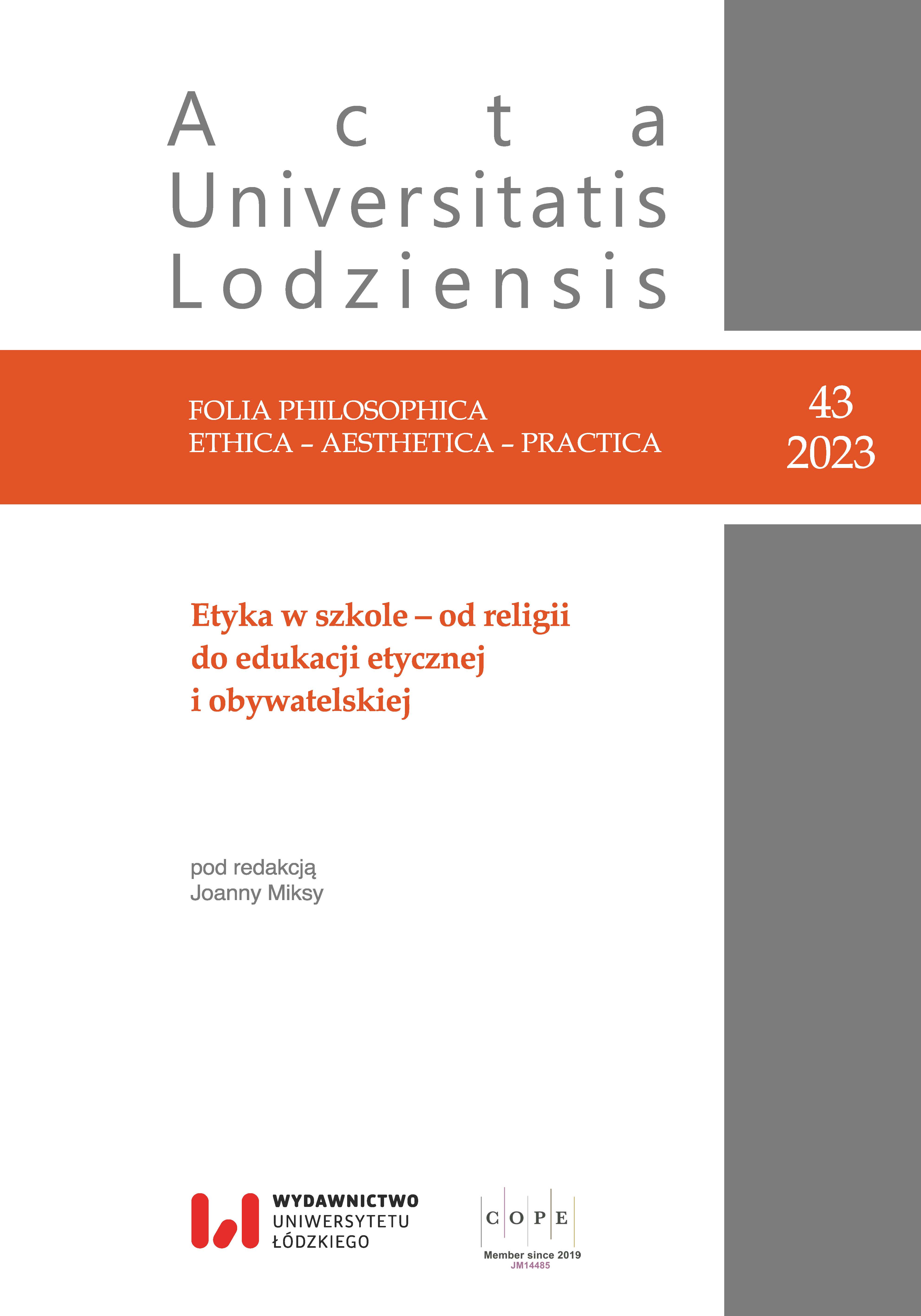Value Ethics, Moral Education and Ethical Education
DOI:
https://doi.org/10.18778/0208-6107.43.03Keywords:
virtue ethics, Aristotle, phronesisAbstract
The teaching of ethics in school is considered important and necessary. But can ethics be taught? And should its teaching consist in conveying knowledge about ethical concepts, possibly a discussion around them, or rather in shaping students’ moral attitudes and appropriate behaviour? The article engages in reflection on these problems with reference to various traditions of ethical thought and moral theory. It proposes to take the contemporary renewed Aristotelian virtue ethics as the main point of reference and basis for educational practice. The concept of phronesis as practical rationality, allowing the formation of moral judgements that are both context-sensitive and take into account the complexity of interests and goods that are difficult to agree upon, seems to be a still valid model for moral education. Teaching and discussion oriented towards the consideration of concrete cases and stories, i.e. training the skills of this type of judgement, avoids the dangers of learning focused on theoretical issues: becoming entangled in definitional ambiguities in defining moral values, or thinking detached from emotion and experience. Learning that consists of analysing a philosophical tradition runs the risk that the knowledge imparted will prove inadequate to the age and level of personal development of the student, generating moral subjectivism and relativistic scepticism. However, this argument is not directed against theorising and the introduction of abstract considerations in the educational process, even at the earliest stages: theorising and the construction of rational justifications are necessary but should result from the inspiration and development of intellectual predispositions, not from the transmission of ready-made knowledge.
References
Annas, J. (2011). Intelligent Virtue. Oxford: Oxford University Press.
Google Scholar
DOI: https://doi.org/10.1093/acprof:oso/9780199228782.001.0001
Anscombe, E. (1958). Modern moral philosophy. Philosophy, 124 (33), s. 1–16.
Google Scholar
DOI: https://doi.org/10.1017/S0031819100037943
Arystotles. (1941a). Nicomachean Ethics. W: McKeon, R. (red.), The Basic Works of Aristotle. New York: Random House, Księga 1, Część 3, s. 936.
Google Scholar
Arystotles. (1941b). Poetics. W: McKeon, R. (red.), The Basic Works of Aristotle. New York: Random House, s. 1453–1487.
Google Scholar
Arystotles. (1941c). Politics. W: McKeon, R. (red.), The Basic Works of Aristotle. New York: Random House, s. 1113–1316.
Google Scholar
Bohlin, K. (2005). Teaching Character Education through Literature. Oxon and New York: RoutledgeFalmer.
Google Scholar
DOI: https://doi.org/10.4324/9780203299838
Carr, D. (2003). Character and moral choice in the cultivation of virtue. Philosophy, 78, s. 219–232.
Google Scholar
DOI: https://doi.org/10.1017/S0031819103000251
Carr, D. (2015). The paradox of gratitude. British Journal of Educational Studies, 63 (4), s. 429–446.
Google Scholar
DOI: https://doi.org/10.1080/00071005.2015.1011077
Carr, D. i Harrison, T. (2014). Educating Character through Stories. Exeter: Imprint Academic.
Google Scholar
Dent, N. (1984). The Moral Psychology of the Virtues. Cambridge: Cambridge University Press.
Google Scholar
Driver, J. (2001). Uneasy Virtue. Cambridge: Cambridge University Press.
Google Scholar
DOI: https://doi.org/10.1017/CBO9780511498770
Foot, P. (1978). Virtues and Vices. Oxford: Blackwell.
Google Scholar
Geach, P. (1977). The Virtues. Cambridge: Cambridge University Press.
Google Scholar
Haydon, G. (2009). Reason and virtues: the paradox of R. S. Peters on moral education. Journal of Philosophy of Education, 43 (suplement do wydania 1), s. 173–188.
Google Scholar
DOI: https://doi.org/10.1111/j.1467-9752.2009.00717.x
Hursthouse, R. (1999). On Virtue Ethics. Oxford: Oxford University Press.
Google Scholar
Kant, I. (1967). The Critique of Practical Reasoning and Other Works on the Theory of Ethics. Tłum. T. K. Abbott. London: Longmans.
Google Scholar
Kohlberg, L. (1984). Essays on Moral Development, New York: Harper Row, t. 1.
Google Scholar
MacIntyre, A. (1981). After Virtue. Notre Dame: Notre Dame Press.
Google Scholar
MacIntyre, A. (1988). Whose Justice, Which Rationality? Notre Dame: Notre Dame Press.
Google Scholar
MacIntyre, A. (1992). Three Rival Versions of Moral Enquiry. Notre Dame: Notre Dame Press.
Google Scholar
McCall. C. (2009). Transforming Thinking: Philosophical Inquiry in the Primary and Secondary Classroom. London: Routledge.
Google Scholar
McDowell, J. ([1979] 1992). Virtue and reason. W: Crisp, R., Slote, M. (red.), Virtue Ethics. Oxford: Oxford University Press.
Google Scholar
Mill, J. S. (1970). Utilitarianism. W: Warnock, M. (red.), Utilitarianism. London and Glasgow: The Fontana Library.
Google Scholar
Murdoch, I. (1970). The Sovereignty of the Good. London: Routledge and Kegan Paul.
Google Scholar
Murdoch, I. ([1988] 1993). Non-relative virtues: An Aristotelian approach. W: Nussbaum, M. C., Sen, A. (red.), The Quality of Life. Oxford: Oxford University Press.
Google Scholar
Murdoch, I. (2003). Metaphysics as a Guide to Morals. London: Vintage Classics.
Google Scholar
Nussbaum, M. (1995). Aristotle on human nature and the foundations of ethics. W: Altham, J. E. J., Harrison, R. (red.), World, Mind and Ethics. Cambridge: Cambridge University Press.
Google Scholar
DOI: https://doi.org/10.1017/CBO9780511621086.007
Peters, R. S. (1981). Moral Development and Moral Education. London: George Allen and Unwin.
Google Scholar
Piaget, J. (1997). The Moral Judgement of the Child. New York: Free Press Paperbacks.
Google Scholar
Plato. (1961). Gorgias and Republic. W: Hamilton, E., Cairns, H. (red.), Plato: The Collected Dialogues. Princeton: Princeton University Press.
Google Scholar
DOI: https://doi.org/10.1515/9781400835867
Rawls, J. (1985). A Theory of Justice. Cambridge: Harvard University Press.
Google Scholar
Rousseau, J. J. (1974). Emile. London: Everyman’s Library.
Google Scholar
Sanderse, W. (2014). An Aristotelian model of moral development. Journal of Philosophy of Education, 49(3), s. 382–398.
Google Scholar
DOI: https://doi.org/10.1111/1467-9752.12109
Sherman, N. (1989). The Fabric of Character: Aristotle’s Theory of Virtue. Oxford: Oxford University Press.
Google Scholar
Sherman, N. (1997). Making a Necessity of Virtue: Aristotle and Kant on Ethics. Cambridge: Cambridge University Press.
Google Scholar
DOI: https://doi.org/10.1017/CBO9780511624865
Slote, M. (1983). Goods and virtues. Oxford: Clarendon Press.
Google Scholar
Slote, M. (1992). From Morality to Virtue. New York: Oxford University Press.
Google Scholar
Slote, M. (2010). Moral Sentimentalism. Oxford: Oxford University Press.
Google Scholar
DOI: https://doi.org/10.1093/acprof:oso/9780195391442.001.0001
Swanton, C. (2003). Virtue Ethics: A Pluralistic View. Oxford: Oxford University Press.
Google Scholar
DOI: https://doi.org/10.1093/0199253889.001.0001
Taylor, R. (2002). Virtue Ethics: An Introduction. New York: Prometheus Books.
Google Scholar
Wallace, J. (1978). Virtues and Vices. Ithaca and London: Cornell University Press.
Google Scholar
Downloads
Published
How to Cite
Issue
Section
License

This work is licensed under a Creative Commons Attribution-NonCommercial-NoDerivatives 4.0 International License.












